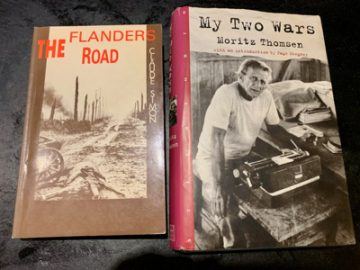by Maniza Naqvi
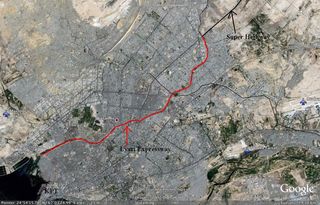 Nearly 80 percent of the war supplies, non lethal war supplies, as they are called, for the US led coalition troops fighting in Afghanistan, snake through the city of Karachi. Much of the containers and oil tankers to the north from the Port either go through the Northern Bypass or through the National Highway from the oil terminal in Keamari. The Lyari Expressway does not carry heavy traffic although it was meant to and by night its southbound track shifts to becoming a northbound route carrying lighter cargo from the port to the Super highway which leads all the way to the Khyber Pass in the North at the border with Afghanistan. If the war in Afghanistan stops then the violence in Karachi and in Pakistan will subside. Just think what this war machinery moving through Karachi means for the city and what impact it has on the security, society and on the economy when it moves through the country going from the south of the country to the north to the Khyber Pass. Safe passage of these precious goods is assured through the city by gangs of extortionists and enforcers who collect a fee—Bhatta from the war enterprise. These gangs have deep connections to the militaries, international mercenaries and political parties. Their leaders are the biggest Bhatta collectors in the chain and are given safe haven to live in Dubai and in London. International business interests and local armed mercenaries have made Karachi their base to protect their war supplies. There is big money to be made. Karachi has always been of interest to Empire and it has never let it go. Their bidding is done through petty gangs across the city who have also learned to collect Bhatta from ordinary citizens, households and shopkeepers. These extortionists know how to enforce their rules: Non compliance means death.
Nearly 80 percent of the war supplies, non lethal war supplies, as they are called, for the US led coalition troops fighting in Afghanistan, snake through the city of Karachi. Much of the containers and oil tankers to the north from the Port either go through the Northern Bypass or through the National Highway from the oil terminal in Keamari. The Lyari Expressway does not carry heavy traffic although it was meant to and by night its southbound track shifts to becoming a northbound route carrying lighter cargo from the port to the Super highway which leads all the way to the Khyber Pass in the North at the border with Afghanistan. If the war in Afghanistan stops then the violence in Karachi and in Pakistan will subside. Just think what this war machinery moving through Karachi means for the city and what impact it has on the security, society and on the economy when it moves through the country going from the south of the country to the north to the Khyber Pass. Safe passage of these precious goods is assured through the city by gangs of extortionists and enforcers who collect a fee—Bhatta from the war enterprise. These gangs have deep connections to the militaries, international mercenaries and political parties. Their leaders are the biggest Bhatta collectors in the chain and are given safe haven to live in Dubai and in London. International business interests and local armed mercenaries have made Karachi their base to protect their war supplies. There is big money to be made. Karachi has always been of interest to Empire and it has never let it go. Their bidding is done through petty gangs across the city who have also learned to collect Bhatta from ordinary citizens, households and shopkeepers. These extortionists know how to enforce their rules: Non compliance means death.
Hundreds of residents of Karachi have lost their lives to violence in July and August of 2011 alone. Since the beginning of the US led war in Afghanistan in 2001 thousands of citizens of Pakistan and Karachi residents have been killed. The war in Afghanistan in the 1980s had a similarly gruesome impact.
The Lyari Expressway was meant to carry heavy loads and its northbound traffic from the port of Karachi was opened in December 2009. The Expressway was meant to be able to shift goods to and from the port on a high speed route bypassing the congested streets of the city center. But the Northbound route has not become fully functional yet. Nor can the Expressway carry heavy loads such as oil tankers. The Lyari Expressway was highly controversial when it was under design and it was opposed by citizens and community action groups, urban planners and activists because it displaced thousands of people, their homes and livelihoods, and it threatened to change the social fabric of the city. But it was built anyway under the Military regime of General Musharraf. Some who opposed the expressway were killed including one who belonged to a well known family and was also a political and social leader and activist who opposed the construction of the Expressway. He was found dead in 2002 inexplicably and improbably by having committed suicide by hanging himself in the guest room of his family home. Another person among many an FM station talk show host who was spoke up against the Expressway on his show was beaten up and threatened that he would be pushed off the roof of the building where the radio station was housed. Construction of the Expressway began in 2002. The bomb blast and the fire in Bolton Market which occurred during a Moharram procession in 2009, many believe, simply cleared out the shopkeepers and traders who had earlier refused to move out of the way of the Lyari Expressway’s planned support route.
The Lyari Expressway’s primary purpose was and is to provide a swift route for goods moving from the port to the rest of the country up north and bringing supplies down to the port. It carries to and fro from the port precious and high value imports and exports: the supplies going to the war and as most Karachi residents are convinced heroine from Afghanistan trucked back to the same waiting ships that bring in war supplies. Hardly any civilian city traffic can be seen on this Expressway.
The forces that rule Karachi thrive on the enterprise of war in Afghanistan. They dream of making Karachi a Dubai or a Singapore or a Hongkong. They in turn are linked to the petty street and neighborhood thugs linked to organized gangs and gang bosses who owe allegiance to these bigger bosses. They all owe each other. They are in the business of land grabbing, logistics, finance, drugs and weapons trade.
Whoever can ensure the war supply routes is king. Whoever can do that extorts Bhatta. This is the artery that feeds the heart of the golden goose. The Lyari Expressway in parts of the city is elevated above rooftops and in others runs alongside densely packed neighborhoods and passes through and over all the areas of Karachi currently in flames. The war supplies are swiftly moved on cargo trucks by night over this flyover that passes on a raised structure through the heart of the city passing alongside the large slum of Lyari, then through all of the city’s neighborhoods—while the war supplies move unobstructed from the Karachi port towards Afghanistan a war rages in Karachi including turf battles and land grabbing and strong arming to ensure territorial rights for guaranteeing the safe passage of the war machinery. The war supplies for Afghanistan bring death and destruction as their daily traffic to Karachi.
A drive on the Expressway feels eerily like on an exclusive and unobstructed rollercoaster ride dipping and rising alongside and above the city from the port on either side are the sprawling, densely packed and heavily congested neighborhoods and traffic congested streets of Lyari, Ranchore Lines, Soldier Bazaar, Liaqatabad, Nazimabad, Orangi, Sohrab Goth, Gulberg all the way till it reaches the Superhighway on the city’s outskirts.
Karachi a city of nearly 20 million people spreads out on either side of the expressway and convulses with its toxic impact. The graffiti on the massive structure’s concrete walls—and pillions hint of the rage that seethes around it. Each night while millions of Karachi residents try to sleeps or lie awake unable to sleep because of the heat and power cuts or anxiety over the raging violence in the streets—the war supplies slip by –slithering quietly and silently from the Port through and around the city swiftly, smoothly, safely.
Karachi was a tiny fishing village more than 150 years ago. It became a lucrative piece of real estate for Empire as its trading outpost and a cantonment town when the war began in Afghanistan between Britain and Russian in 1850s for territorial control of Central Asia. Then Great Game of Empires was on as it is now. The Empire owned Karachi then as it does now. Traders flocked to Karachi from other parts of India to position themselves as suppliers and servicers of the war around the newly built port which was built for the purpose of war supplies to be able to supply the war. Mercenaries and the army of the British Empire was housed in barrack in the city—in places named Abyssinia Line and Ranchore Lines. War had always benefited the city. In 1838, the British afraid of the Russian Empire’s expansion to the Arabian Sea, occupied Karachi and the city served as the landing port for their troops for the First Afghan War. In 1843, they annexed Sindh and shifted the capital of the province from Hyderabad to Karachi. Then the British made Sindh a district of the Bombay Presidency and Karachi was made the district headquarters. Troops were stationed in Karachi and businessmen from all over the country arrived to cater to the needs of the army, an opportunity not to be missed. Karachi started to become a vibrant town, particularly the part where the military barracks and commercial activities merged particularly at the confluence of the military barracks and commercial sector. This area became known as Saddar, the Presidency. Karachi is built on and continues to expand on the land grabbing effort called Empire and War—and within it, the forces that rule it—have grabbed land from small villages called Goths to expand its boundaries the biggest land mafia is probably the military with its Defense Housing Societies where the elite of the city live. Land is grabbed from the poor and it is grabbed from the sea. Reclamation of land from the sea continues unchecked and unregulated with no regard to the environment or to city planning. It is handled improperly, senselessly and dangerously with construction beginning even before the land has dried.
Karachi has always been the conduit for the supplies of war. In the powerful, muliti layered and international mercenary war machinery these local guarantors of safe passage of war goods are just petty thieves and gangs, extortionists who murder and collect Bhatta—extortion fees. But in the lives of Karachi and Pakistan’s citizens they are the biggest bosses, the most powerful forces of rulers and administrators, the police, the army, the politicians.
Whoever can ensure safe passage for war supplies extracts Bhutta from the war enterprise and controls Karachi . And this system extends all the way North along the supply route on the Super highway which cuts through the entire country from Karachi to Khyber Pass. All the way to Khyber Pass from the Karachi port extortionists, enforcers and service providers for the war machinery. Extortion cascades from the top down—from the Generals to the political leaders to their minions of militias and gangs. Extortion. Bhatta.
The routes of war supplies and their traffic must be part of the story of why there is such murder, mayhem and criminal violence in Karachi. The violence must be seen through the prism of war and land grabbing. The war is profitable for all those involved in making it happen. As long as the war goes on the gangs in Karachi and Pakistan will be encouraged to keep fighting and killing each other for the profitable business of collecting Bhatta for ensuring safe passage for these goods and to keep the conveyor belt for war supplies running smoothly. An analysis of what is happening in Karachi which looks for its root causes in poverty, ethnicity, population and a lack of services tells only a very small part of the story. This suits the enterprise of war because it ensures that the route for war continues uninterrupted.
Also by Maniza Naqvi (here):


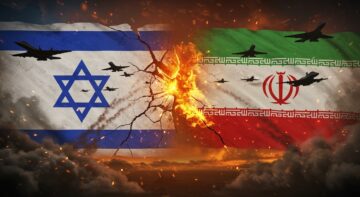 Watching Israel and Iran lob bombs at each other these last few weeks makes me tired. Just when the world seemed completely destabilized and clinically looney, two countries who both trace their religions back to Abraham or Ibrahim decide to make things worse. I know you’re supposed to reach for the most recent issue of Foreign Affairs or parse treaties on nuclear non-proliferation to make sense of this missile orgy, but this latest war might make you reach for your earplugs and blindfold instead.
Watching Israel and Iran lob bombs at each other these last few weeks makes me tired. Just when the world seemed completely destabilized and clinically looney, two countries who both trace their religions back to Abraham or Ibrahim decide to make things worse. I know you’re supposed to reach for the most recent issue of Foreign Affairs or parse treaties on nuclear non-proliferation to make sense of this missile orgy, but this latest war might make you reach for your earplugs and blindfold instead.
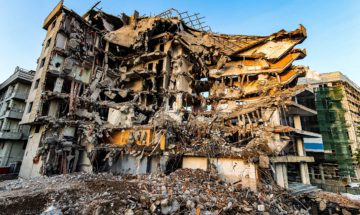
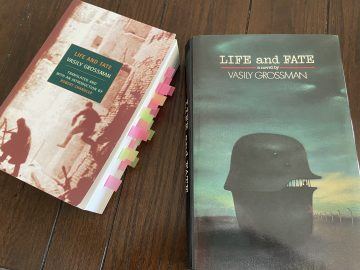 On June 22, 1941, Nazi Germany attacked the Soviet Union in a typhoon of steel and firepower without precedent in history. In spite of telltale signs and repeated warnings, Joseph Stalin who had indulged in wishful thinking was caught completely off guard. He was so stunned that he became almost catatonic, shutting himself in his dacha, not even coming out to make a formal announcement. It was days later that he regained his composure and spoke to the nation from the heart, awakening a decrepit albeit enormous war machine that would change the fate of tens of millions forever. By this time, the German juggernaut had advanced almost to the doors of Moscow, and the Soviet Union threw everything that it had to stop Hitler from breaking down the door and bringing the whole rotten structure on the Russian people’s heads, as the Führer had boasted of doing.
On June 22, 1941, Nazi Germany attacked the Soviet Union in a typhoon of steel and firepower without precedent in history. In spite of telltale signs and repeated warnings, Joseph Stalin who had indulged in wishful thinking was caught completely off guard. He was so stunned that he became almost catatonic, shutting himself in his dacha, not even coming out to make a formal announcement. It was days later that he regained his composure and spoke to the nation from the heart, awakening a decrepit albeit enormous war machine that would change the fate of tens of millions forever. By this time, the German juggernaut had advanced almost to the doors of Moscow, and the Soviet Union threw everything that it had to stop Hitler from breaking down the door and bringing the whole rotten structure on the Russian people’s heads, as the Führer had boasted of doing.